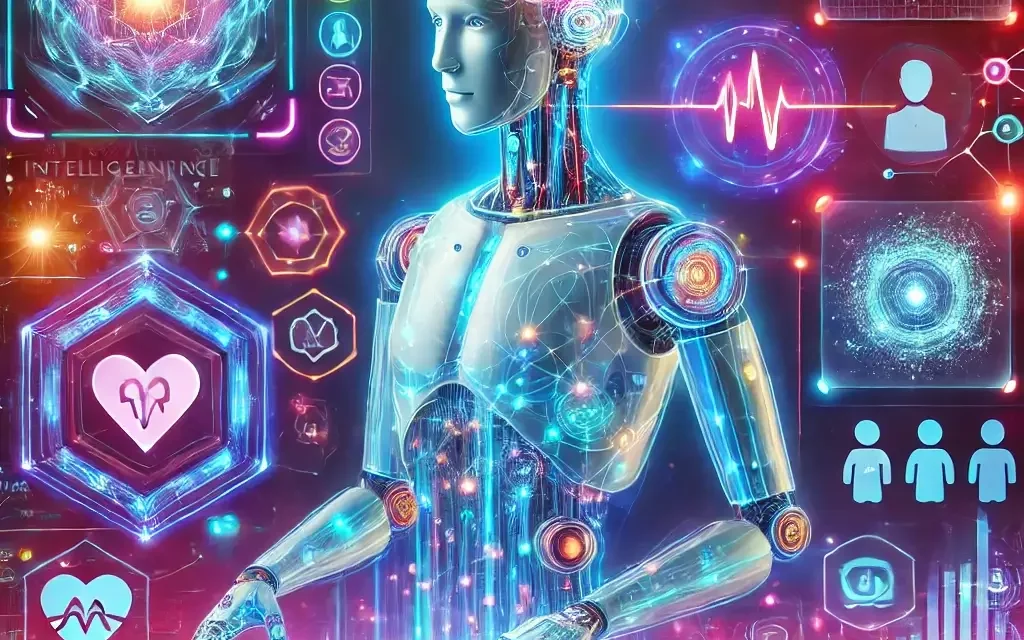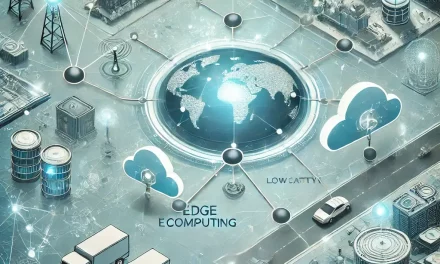Artificial Intelligence (AI) is no longer a futuristic concept—it is a transformative force reshaping industries and redefining how we interact with technology. From self-driving cars to personalized recommendations on streaming platforms, AI is at the heart of innovations that make our lives smarter, faster, and more efficient. This article explores the impact of AI, its applications across various sectors, and what the future holds.
What is Artificial Intelligence?
Artificial Intelligence refers to the simulation of human intelligence in machines that are programmed to think, learn, and adapt. AI technologies can analyze vast amounts of data, recognize patterns, and make decisions faster than humans.
Key components of AI include:
- Machine Learning (ML): Algorithms that allow systems to learn and improve from experience.
- Natural Language Processing (NLP): Enables machines to understand and respond to human language.
- Computer Vision: AI’s ability to interpret visual data, such as images and videos.
- Robotics: Combining AI with mechanical systems to create intelligent machines.
Applications of AI Across Industries
1. Healthcare
AI is revolutionizing healthcare by enabling faster diagnoses, personalized treatment plans, and more efficient operations.
- Predictive Analytics: AI algorithms analyze patient data to predict diseases like cancer or diabetes.
- Medical Imaging: Computer vision enhances the accuracy of detecting anomalies in X-rays and MRIs.
- Virtual Health Assistants: Chatbots powered by AI provide patients with medical advice and appointment scheduling.
2. Finance
The financial industry relies heavily on AI for its ability to process massive amounts of data quickly and accurately.
- Fraud Detection: AI identifies unusual patterns that may indicate fraudulent activity.
- Algorithmic Trading: AI-driven systems execute trades at optimal times based on real-time market analysis.
- Personalized Banking: Virtual financial assistants help customers manage budgets and savings.
3. Retail
AI enhances customer experiences and streamlines retail operations.
- Recommendation Engines: Platforms like Amazon and Netflix use AI to suggest products or content based on user behavior.
- Inventory Management: AI predicts demand and optimizes supply chains.
- Chatbots: Retailers use AI-powered chatbots for customer support and personalized shopping assistance.
4. Transportation
AI is driving advancements in the transportation sector, making travel safer and more efficient.
- Autonomous Vehicles: Companies like Tesla are developing self-driving cars using AI and machine learning.
- Traffic Management: AI analyzes real-time traffic data to reduce congestion and improve route planning.
- Logistics Optimization: AI streamlines shipping routes and delivery schedules.
Challenges of AI Adoption
While AI offers immense potential, its widespread adoption comes with challenges:
- Data Privacy: AI systems often require access to vast amounts of personal data, raising concerns about security and ethics.
- Job Displacement: Automation powered by AI could lead to job losses in certain sectors.
- Bias in Algorithms: AI systems can perpetuate biases if trained on unbalanced data.
Addressing these challenges requires collaboration between governments, organizations, and technologists to ensure AI benefits society as a whole.
The Future of AI
As AI continues to evolve, its applications will expand, becoming even more integrated into daily life:
- Generative AI: AI systems like GPT can create content, from writing articles to generating images.
- AI in Education: Personalized learning platforms will tailor educational content to individual students.
- Sustainable Development: AI can optimize renewable energy sources and improve waste management systems.
AI is poised to revolutionize sectors we can’t yet imagine, making it one of the most exciting technological developments of our time.
Conclusion
Artificial Intelligence is not just a technological advancement; it’s a paradigm shift with the potential to redefine the way we live and work. As we continue to unlock its capabilities, AI will undoubtedly shape the future, solving complex problems and driving innovation across every industry. However, it’s essential to approach this transformative technology with responsibility, ensuring its development aligns with ethical and societal goals.






RZGLQ SlAj DKiYDHz
The post is extremely educational. I found a lot in it. Thank you for sharing.
This is very useful; I’ve added to my bookmarks it for later use.
Your posts always leave me feeling motivated and empowered You have a gift for inspiring others and it’s evident in your writing
I completely agree with your perspective on this topic It’s refreshing to see someone presenting a balanced and thoughtful viewpoint
Love this blog! The content is always so relevant and insightful, keep up the great work!
Thank you for the amazing blog post!
This post is jam-packed with valuable information and I appreciate how well-organized and easy to follow it is Great job!
You have a way of making each of your readers feel seen and heard That’s a special quality that not all bloggers possess Thank you for creating a safe space for us
I love how this blog gives a voice to important social and political issues It’s important to use your platform for good, and you do that flawlessly
Your blog has quickly become one of my favorites I am constantly impressed by the quality and depth of your content
Your blog has helped me through some tough times and I am so grateful for your wise words and positive outlook
0keh2i
супрастин инструкция по применению цена таблетки взрослым от аллергии дозировка [url=https://аллергиястоп.рф/]https://аллергиястоп.рф/[/url] .
yybms6
8mih28
13e7ys
trpgus
[url=https://piter-news.net/other/2025/04/17/528943.html]Подготовка к вузу онлайн
Москва. Лучший психолог в районе Щукино . Проверенные отзывы пациентов. Запишись сейчас Психолог в Москве.
Мы обязательно поможем преодолеть эмоциональный кризис, избавиться от тревожности и апатии, справиться со стрессом и депрессией, связанными с неуверенностью и многим другим.
Задайте интересующие вас вопросы или запишитесь на сеанс к психологу.
Раздражительность на членов своей семьи.
Записаться на консультацию.
Москва. Психолог Куркино в Москве Психолог в Москве.
Психолог Москва. Психолог СПБ. Психолог онлайн.
Психолог владеет множеством приемов и техник, которые помогут разобраться в себе.
Решим вместе вашу проблему.
Психолог, Сайт психологов.
Москва. Психолог Москва. Психолог онлайн. Консультация психолога в МСК Психолог в Москве.
98151 проверенных отзывов.
Запись на прием, оплата, подробная информация о специалистах и отзывы клиентов.
Записаться на консультацию.
Психологическое консультирование заключается в том, чтобы помочь клиенту разобраться в своих проблемах и вместе с ним найти пути выхода из сложной ситуации.
12 профилей в Дизайне человека. Исследователь. Отшельник. Мученик. Оппортунист. Еретик. Ролевая модель. Канал 57 34
Тип – это основа, но ваша уникальность проявляется через Профиль, Центры, Каналы и Ворота.
Профили в Дизайне человека · 1 линия — Исследователь · 2 линия — Отшельник · 3 линия — Мученик · 4 линия — Опортунист · 5 линия — Еретик · 6 линия — Ролевая модель.
12 профилей в Дизайне человека. Исследователь. Отшельник. Мученик. Оппортунист. Еретик. Ролевая модель.
Профиль в Дизайне Человека — это уникальная комбинация двух линий, которые формируют ваш характер и способы взаимодействия с миром.
Понимание своего Дизайна Человека может помочь в выборе жизненного пути, который лучше соответствует вашему характеру и предназначению. Генератор 1 3 знаменитости
Дизайн человека может помочь вам лучше понимать людей вокруг вас, их энергетический тип, и как лучше взаимодействовать с ними.
Дизайн Человека позволяет учитывать индивидуальные особенность каждого человека и учит познавать свою истинную природу.
12 профилей в Дизайне человека. Исследователь. Отшельник. Мученик. Оппортунист. Еретик. Ролевая модель.
В целом, Дизайн человека может быть полезным инструментом для самопознания, саморазвития, и улучшения качества жизни. Он помогает понять себя и окружающий мир, и найти свой путь, который приносит счастье и удовлетворение.
Каждый Профиль состоит из двух Линий: Сознательной и Подсознательной. Соляр онлайн
В целом, Дизайн человека может быть полезным инструментом для самопознания, саморазвития, и улучшения качества жизни. Он помогает понять себя и окружающий мир, и найти свой путь, который приносит счастье и удовлетворение.
Дизайн человека – это система, которая предлагает анализ личности на основе информации о дате, времени и месте рождения.
Дизайн Человека (human design) – это система знаний об энергетической механике людей и космологическом устройстве мира.
12 профилей в Дизайне человека. Исследователь. Отшельник. Мученик. Оппортунист. Еретик. Ролевая модель.
2o9o4t
Для каждого человека естественного искать выгоду для себя. Так происходит и с Дизайном Человека. Центры дизайн человека
12 профилей в Дизайне человека. Исследователь. Отшельник. Мученик. Оппортунист. Еретик. Ролевая модель.
Понимание своего Дизайна Человека может помочь в выборе жизненного пути, который лучше соответствует вашему характеру и предназначению.
В целом, Дизайн человека может быть полезным инструментом для самопознания, саморазвития, и улучшения качества жизни. Он помогает понять себя и окружающий мир, и найти свой путь, который приносит счастье и удовлетворение.
Анализ своего Дизайна Человека может помочь в понимании причин, по которым вы испытываете определенные трудности, разочарования, и как можно их преодолеть.
Дизайн человека делит людей на четыре категории, помогает узнать себя и показывает путь к счастливой жизни.
Дизайн человека может помочь вам лучше понимать людей вокруг вас, их энергетический тип, и как лучше взаимодействовать с ними. Spaces ru главная страница
Анализ своего Дизайна Человека может помочь в понимании причин, по которым вы испытываете определенные трудности, разочарования, и как можно их преодолеть.
Тип – это основа, но ваша уникальность проявляется через Профиль, Центры, Каналы и Ворота.
Профили в Дизайне человека · 1 линия — Исследователь · 2 линия — Отшельник · 3 линия — Мученик · 4 линия — Опортунист · 5 линия — Еретик · 6 линия — Ролевая модель.
Профиль в Дизайне Человека — это уникальная комбинация двух линий, которые формируют ваш характер и способы взаимодействия с миром. Хьюман дизайн центры
Дизайн Человека (human design) – это система знаний об энергетической механике людей и космологическом устройстве мира.
Профиль в Дизайне Человека — это уникальная комбинация двух линий, которые формируют ваш характер и способы взаимодействия с миром.
В целом, Дизайн человека может быть полезным инструментом для самопознания, саморазвития, и улучшения качества жизни. Он помогает понять себя и окружающий мир, и найти свой путь, который приносит счастье и удовлетворение.
Дизайн человека может помочь вам лучше понимать людей вокруг вас, их энергетический тип, и как лучше взаимодействовать с ними.
Дизайн человека помогает понять, какой тип энергии вы излучаете, как вы принимаете решения, и как лучше использовать свою энергию, чтобы не выгорать, а чувствовать себя более удовлетворённым
jchcis
mxphhs
лучшая стоматология [url=https://stomatologiya-vladimir-2.ru/]лучшая стоматология[/url] .
Дизайн человека – это система, которая предлагает анализ личности на основе информации о дате, времени и месте рождения. Дизайн человека с бесплатной расшифровкой
Профили в Дизайне человека · 1 линия — Исследователь · 2 линия — Отшельник · 3 линия — Мученик · 4 линия — Опортунист · 5 линия — Еретик · 6 линия — Ролевая модель.
12 профилей в Дизайне человека. Исследователь. Отшельник. Мученик. Оппортунист. Еретик. Ролевая модель.
Дизайн человека помогает понять, какой тип энергии вы излучаете, как вы принимаете решения, и как лучше использовать свою энергию, чтобы не выгорать, а чувствовать себя более удовлетворённым
Дизайн Человека (human design) – это система знаний об энергетической механике людей и космологическом устройстве мира.
Профиль в Дизайне Человека — это уникальная комбинация двух линий, которые формируют ваш характер и способы взаимодействия с миром. Хьюман дизайн совместимость
Дизайн человека делит людей на четыре категории, помогает узнать себя и показывает путь к счастливой жизни.
12 профилей в Дизайне человека. Исследователь. Отшельник. Мученик. Оппортунист. Еретик. Ролевая модель.
Тип – это основа, но ваша уникальность проявляется через Профиль, Центры, Каналы и Ворота.
ow896l
Если интересует купить билеты онлайн в русский музей, вот полезная ссылка. Заходите сюда: [url=https://www.coachingparajovenes.com/russkij-muzei.html]купить билеты онлайн в русский музей[/url].
Нашёл полезный контент о экскурсии по москве-реке, рекомендую. Смотрите тут: [url=http://www.life-renewal.org/corporate-gifts-luxury-handmade-cakes-beautifully-presented-gift-boxes-with-personalised-gift-card/]экскурсии по москве-реке[/url].
eteqxe
Понимание своего Дизайна Человека может помочь в выборе жизненного пути, который лучше соответствует вашему характеру и предназначению. Генные ключи ричард радд
Дизайн человека делит людей на четыре категории, помогает узнать себя и показывает путь к счастливой жизни.
Анализ своего Дизайна Человека может помочь в понимании причин, по которым вы испытываете определенные трудности, разочарования, и как можно их преодолеть.
Дизайн человека – это система, которая предлагает анализ личности на основе информации о дате, времени и месте рождения.
Дизайн человека может помочь вам лучше понимать людей вокруг вас, их энергетический тип, и как лучше взаимодействовать с ними. Формула души онлайн рассчитать
Дизайн человека – это система, которая предлагает анализ личности на основе информации о дате, времени и месте рождения.
Профили в Дизайне человека · 1 линия — Исследователь · 2 линия — Отшельник · 3 линия — Мученик · 4 линия — Опортунист · 5 линия — Еретик · 6 линия — Ролевая модель.
12 профилей в Дизайне человека. Исследователь. Отшельник. Мученик. Оппортунист. Еретик. Ролевая модель.
Дизайн Человека (human design) – это система знаний об энергетической механике людей и космологическом устройстве мира.
Анализ своего Дизайна Человека может помочь в понимании причин, по которым вы испытываете определенные трудности, разочарования, и как можно их преодолеть. Определить дизайн человека
Тип – это основа, но ваша уникальность проявляется через Профиль, Центры, Каналы и Ворота.
В целом, Дизайн человека может быть полезным инструментом для самопознания, саморазвития, и улучшения качества жизни. Он помогает понять себя и окружающий мир, и найти свой путь, который приносит счастье и удовлетворение.
Анализ своего Дизайна Человека может помочь в понимании причин, по которым вы испытываете определенные трудности, разочарования, и как можно их преодолеть.
Каждый Профиль состоит из двух Линий: Сознательной и Подсознательной.
Профили в Дизайне человека · 1 линия — Исследователь · 2 линия — Отшельник · 3 линия — Мученик · 4 линия — Опортунист · 5 линия — Еретик · 6 линия — Ролевая модель.
12 профилей в Дизайне человека. Исследователь. Отшельник. Мученик. Оппортунист. Еретик. Ролевая модель.
Дизайн человека делит людей на четыре категории, помогает узнать себя и показывает путь к счастливой жизни.
o1rtph
Тип – это основа, но ваша уникальность проявляется через Профиль, Центры, Каналы и Ворота. Тест на религию
В целом, Дизайн человека может быть полезным инструментом для самопознания, саморазвития, и улучшения качества жизни. Он помогает понять себя и окружающий мир, и найти свой путь, который приносит счастье и удовлетворение.
Понимание своего Дизайна Человека может помочь в выборе жизненного пути, который лучше соответствует вашему характеру и предназначению.
Каждый Профиль состоит из двух Линий: Сознательной и Подсознательной.
Анализ своего Дизайна Человека может помочь в понимании причин, по которым вы испытываете определенные трудности, разочарования, и как можно их преодолеть.
Дизайн Человека позволяет учитывать индивидуальные особенность каждого человека и учит познавать свою истинную природу.
12 профилей в Дизайне человека. Исследователь. Отшельник. Мученик. Оппортунист. Еретик. Ролевая модель.
12 профилей в Дизайне человека. Исследователь. Отшельник. Мученик. Оппортунист. Еретик. Ролевая модель. Дизайн человека тест
Профили в Дизайне человека · 1 линия — Исследователь · 2 линия — Отшельник · 3 линия — Мученик · 4 линия — Опортунист · 5 линия — Еретик · 6 линия — Ролевая модель.
Анализ своего Дизайна Человека может помочь в понимании причин, по которым вы испытываете определенные трудности, разочарования, и как можно их преодолеть.
Дизайн Человека (human design) – это система знаний об энергетической механике людей и космологическом устройстве мира.
12 профилей в Дизайне человека. Исследователь. Отшельник. Мученик. Оппортунист. Еретик. Ролевая модель.
В целом, Дизайн человека может быть полезным инструментом для самопознания, саморазвития, и улучшения качества жизни. Он помогает понять себя и окружающий мир, и найти свой путь, который приносит счастье и удовлетворение.
Профиль в Дизайне Человека — это уникальная комбинация двух линий, которые формируют ваш характер и способы взаимодействия с миром.
Момент или ситуация, когда человек сталкивается с вызовом, трудностями или новым опытом, которые стимулируют его личностный рост. Это означает, что всегда есть возможность выйти из зоны комфорта и преодолеть трудности для достижения более высокого уровня развития и самопонимания. Онлайн консультация
Может быть что угодно: проблемы с деньгами, потеря близкого, конфликт с друзьями или даже просто ощущение, что всё идёт не так, как хотелось бы лучше.
Жизненные трудности – это любые ситуации, которые могут нарушить привычный жизненный уклад и потребовать значительных усилий для их преодоления.
mju87u
Оценка ситуации и попытка найти положительные аспекты. Женская консультация
Человек может ставить новые цели, расширить свой кругозор, заниматься спортом или творчеством.
Жизненные трудности – это часть жизни, и нет необходимости быть “сильным” и игнорировать их. Важно научиться справляться с ними и использовать их для личностного роста.
6v7o3g
[url=http://z-audi.ru/add-mad/2025/05/20/pochemu-u-moskovskih-teatrov-takaya-bolshaya-populyarnost.html]роза хутор высота[/url]
[url=https://imagestun.com/aeroporty-moskvy-glavnye-vozdushnye-vorota-rossii/]где находится роза хутор[/url]
шкаф в народный гараж [url=http://shkaf-parking-3.ru]шкаф в народный гараж[/url] .
Есть некоторые законодательные органы, которые продаются по самым высоким ценам в мире. https://rudi-ueid.citaty-tsitaty.ru
где купить кухню от производителя [url=https://www.kuhnni-na-zakaz1.ru]https://www.kuhnni-na-zakaz1.ru[/url] .
[В науке] Нельзя говорить нельзя. https://vernon-dursl.citaty-tsitaty.ru
септик для частного дома под ключ цена московская область [url=www.septik-pod-klyuch-1.ru/]www.septik-pod-klyuch-1.ru/[/url] .
Выбор определяется как способность выбирать между альтернативами благодаря свободной воле и рациональному суждению. В 1980-х и 1990-х годах сеть стала коммерческой. Поле и дисфункциональное поле. Универсальная метамодель пирамида Короткова.
wfutnp
как оформить кредит с плохой кредитной историей [url=https://www.kredity-plohoj-ki-1.ru]как оформить кредит с плохой кредитной историей[/url] .
Войдите в точку эффектов и переживите их через движение. Рабочее пространство НЛП можно представить как «детскую площадку» или многоквартирный дом. Пирамида логических уровней 2.0 Короткова.
какой банк дает кредит без отказа [url=http://www.kredit-bez-otkaza-1.ru]какой банк дает кредит без отказа[/url] .
онлайн займ на карту мгновенно без отказа [url=https://zajm-bez-otkaza-1.ru/]zajm-bez-otkaza-1.ru[/url] .
[url=http://uks18.ru/pogruzhenie-v-mobivok/]Популярные букмекерские конторы с лицензией.[/url]
займы сразу на карту без отказа [url=zajm-bez-otkaza-1.ru]zajm-bez-otkaza-1.ru[/url] .
банки кредиты срочно без отказа [url=http://kredit-bez-otkaza-1.ru]банки кредиты срочно без отказа[/url] .
Дипломированный психолог с опытом работы и отзывами клиентов. Психолог онлайн чат. Анонимный онлайн психолог.
Психотерапевт Пенза. Б17 психологи. 603 оценок
Сервис по подбору психолога Психотерапевты Самара. 328 оценок
Психотерапевт Пенза. Сервис по подбору психолога 747 оценок
Психотерапевт Киров. Кпт курган. 654 оценок
Психотерапевт Белгород. Психотерапевт Челны. 930 оценок
Сервис по подбору психолога batmanapollo.ru 813 оценок
md4uka
Психотерапевты Самара. batmanapollo.ru 632 оценок
кухни угловые 1 20 [url=http://www.uglovyye-kukhni-na-zakaz-1.ru]кухни угловые 1 20[/url] .
психолог при неврозе нижний новгород [url=https://psihiatry-nn-1.ru/]https://psihiatry-nn-1.ru/[/url] .
Сервис по подбору психолога Психолог 814 182 оценок
5fyoi9
fjjzv0
частный психиатр [url=https://psihiatry-nn-1.ru/]частный психиатр[/url] .
Психотерапевт Белгород. professorkorotkov.ru 532 оценок
На прием Клинцы. chat-s-psikhologom-v-telegramme.ru 367 оценок
муравейник купить в москве [url=http://kupit-muravinuyu-fermu-1.ru/]муравейник купить в москве[/url] .
ipuv3i
te3boe
cdbnf0
В17 психология. chat-s-psikhologom-v-telegramme.ru 375 оценок
объявление услуги экскаватора [url=https://arenda-ehkskavatora-1.ru]объявление услуги экскаватора[/url] .
Психотерапевт Пенза. Психолог онлайн 820 оценок
Сервис по подбору психолога Психотерапевт онлайн 765 оценок
p42eqf
top de cl?nicas de cosmetolog?a [url=http://clinics-marbella-1.com/]top de cl?nicas de cosmetolog?a[/url] .
kr31dk
Сервис по подбору психолога Психотерапевт онлайн 907 оценок
сайт клиники косметологии [url=https://clinics-marbella-1.ru/]сайт клиники косметологии[/url] .
Good shout.
Good shout.
h9xbbq
Nice
bcomtr
k6j0yh
distillate carts area 52
thc gummies
best disposable vaporizers area 52
disposable weed pen area 52
hybrid gummies area 52
full spectrum cbd gummies area 52
best cbd sleep edibles area 52
magic mushrooms area 52
infused pre rolls area 52
thca products area 52
snow caps area 52
liquid diamonds area 52
thca gummies area 52
mood thc gummies area 52
live resin gummies area 52
live resin area 52
live resin carts area 52
microdose thc area 52
thc vape hybrid area 52
thc gummies for pain area 52
thc tinctures area 52
best indica thc weed pens area 52
indica gummies area 52
thca diamonds area 52
thca flower area 52
weed vape area 52
best sativa thc carts area 52
Психотерапевты Самара. Психолог онлайн 596 оценок
[url=https://esenatorova.ru/gde-snyat-kvartiru-v-moskve-posutochno-bez-pereplat/]купить квартиру[/url]
[url=https://jadeufa.ru/gde-kupit-1-komnatnuyu-kvartiru-v-moskve-nedorogo-v-2025-godu-top-rajonov/]квартиры в новостройке[/url]
qjys2q
Психотерапевты Самара. Психиатр онлайн 281 оценок
Как сложить юбку чтобы она не помялась Защита хрупких предметов одеждой. 931 благодарностей
ER
OA
круглосуточная стоматология в Архангельске [url=https://stomatologiya-arhangelsk-1.ru/]круглосуточная стоматология в Архангельске[/url] .
багги 4 местный купить [url=http://baggi-1-1.ru]багги 4 местный купить[/url] .
Nice
best sativa thc edibles area 52
thc gummies for anxiety area 52
pre rolls area 52
live rosin gummies area 52
thc oil area 52
thc sleep gummies area 52
thcv gummies area 52
thca disposable area 52
liquid thc area 52
Многослойность как принцип организации. Система кубиков для идеального порядка. 814 благодарностей
CD
строительство домов строительная компания [url=https://stroitelstvo-doma-1.ru/]https://stroitelstvo-doma-1.ru/[/url] .
Если тема винлайн скачать актуальна, вот материал. Подробности: [url=https://inforen.ru/2025/07/pochemu-stavki-na-sport-otlichnyj-sposob-zarabotat-i-poluchit-udovolstvie/]винлайн скачать[/url].
Нашёл полезный контент о бетсити букмекерская контора, рекомендую заглянуть. Ссылка тут: [url=https://govp.info/betsiti-dostojnyij-bukmeker-dlya-professionalov-i-novichkov.html]бетсити букмекерская контора[/url].
qxo58d
Психолог оценили 8353 раз
ремонт квартир под ключ недорого [url=https://www.remont-kvartir-pod-klyuch-1.ru]ремонт квартир под ключ недорого[/url] .
Дизайн человека 39 18
21 Ворота Дизайн человека
53 Ворота Дизайн человека
5 Ворота Дизайн человека
1 Ворота Дизайн человека
26 Ворота Дизайн человека
19 Ворота Дизайн человека
29 Ворота Дизайн человека
13 Ворота Дизайн человека
9 Ворота Дизайн человека
56 Ворота Дизайн человека
42 Ворота Дизайн человека
0mjce8
Если ищете инфу о займов, вот сайт. Смотрите тут: [url=https://newdaynews.ru/politics/744560.html?utm_referrer=https:%2F%2Fyandex.ru%2Fnews%2Fstory%2FVEkaterinburge_proshla_tretya_massovaya_akciya_protiv_QR-kodov–929ffe50bedaea70f1aaff2dca249665]займов[/url].
Информация о быстрый займ может пригодиться. Смотрите тут: [url=https://football.kulichki.net/ruschamp/16/2p.htm]быстрый займ[/url].
Hi! Do you know if they make any plugins to protect against hackers? I’m kinda paranoid about losing everything I’ve worked hard on. Any recommendations?
number